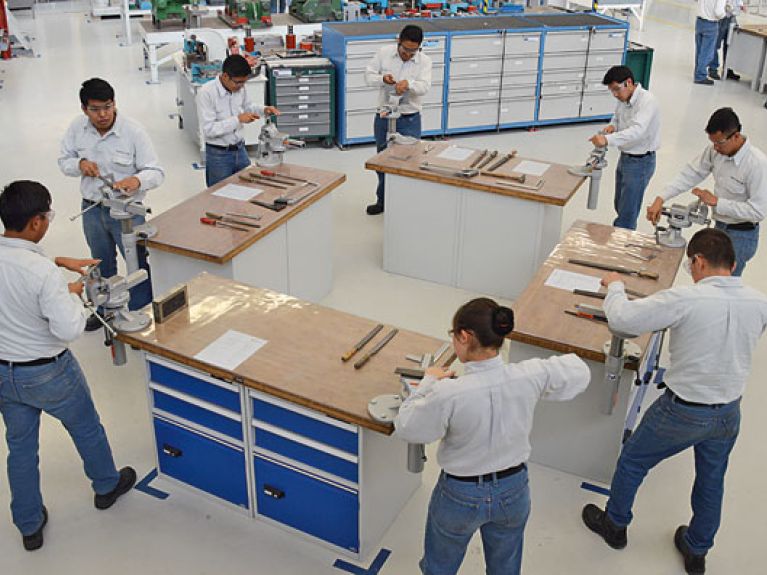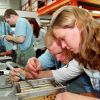Pioneer in Mexico: Volkswagen Group Academy
In Mexico, Volkswagen has provided vocational training based on the German model for the past 50 years.

Pioneer in Mexico: Volkswagen Group Academy
A whole new world opened up to Ernesto Reyes when his big sister came home with circuit diagrams. He was 13 years old and he, too, wanted to learn about such exciting things. Today, the 18-year-old is training as a mechatronics engineer with Volkswagen Mexico. He skilfully operates industrial robots and installs circuit boards. Reyes had always been keen on cars, even as a child. Which means he’s come to just the right place in Puebla, where in 1965 Volkswagen laid the foundation stone for its first production plant in Mexico.
There are still black and white photographs from that period. They show the building plot surrounded by fields of maize. At the time, farming was the main source of income in Puebla. There were no skilled workers to be found anywhere nearby, which is why the Volkswagen Group Academy began its first training course immediately after the foundation stone was laid. Most of the trainees were the sons of farmers. They learned how to grind, chisel and saw – basic skills needed for the VW Beetle. The demands on today’s trainees are greater. Cars like the Jetta and the Golf are manufactured using state-of-the-art robots.
“Eighty per cent of the training is practice, twenty per cent theory,” says mechatronics teacher Juan Carlos Torres. For a long time, VW was the only company in Mexico to use the dual vocational training model. The teaching is based on German curricula, but tailored to VW’s needs; the qualifications are not recognised in Germany. Initially, the only real jobs open to graduates were with VW in Puebla. But that’s all changed now. Other carmakers and parts suppliers have built plants in Mexico, and aeronautical engineering, hotel and petrochemical companies also need skilled workers. That’s why the Mexican government is now building a nationwide dual vocational training system with German assistance.
With the VW model, the company covers the costs of the three-year training, including meals and transportation. Unlike in Germany, no wages are paid during this period. Instead, those who have completed the training are guaranteed a job with VW or one of its suppliers, with a monthly starting salary equivalent to 500 euros – which makes it an attractive proposition to many in Mexico where youth unemployment is high. Just like the trip to Germany, which is the prize awarded to the best trainee.
Some 5,600 young men and women have completed the training since 1966. Today, many of them hold responsible positions in management. Although it is not always possible to predict the number of jobs to be filled when the training is finished, according to VW Academy head Thomas Hertwig, so far “everyone that wanted to stay with us has found a job“. In 1985, the first woman began her training with VW; now a quarter of the trainees are women. Anahí Ramírez, the 20-year-old daughter of a taxi driver, wanted to learn how to build cars when she was still a young girl. “I found the technical terms difficult to learn,” she admits, “so I crammed at home in the evenings.” Just like Reyes, who wants to start studying engineering when he has finished his training. ▪
Sandra Weiss

